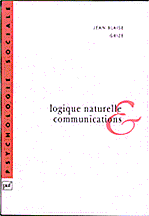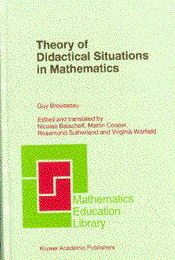| |||||||||||||||||||||||||||||||||||
|
|
|
|
 IREM
IREM 
1997
Coppé S. (1997) Etude des processus de vérification mis en oeuvre par les élèves de première S. Bulletin de l'APMEP 411, 471-484.
Kleiner I., Movshovitz-Hadar N. (1997) Proof: A many-splendored thing. The mathematical intelligencer 19 (3) 16-26
Malara N. A., Gherpelli L. (1997) Argumentazione e dimostrazione in aritmetica nel trienno di escuela media. L'educazione Matematica Anno XVIII - Serie V, 2(2) 82-102.
Mariotti M. A. (1997) Justifying and Proving: Figural and Conceptual Aspects. in: Hejny M., Novotna J. (eds.) Proceedings of the European Conference on Mathematical Education (pp.21-26). Prague: Prometheus Publishing House.1996
Marafioti Garnica A. V. (1996) fascination for the technical, decline of the critical: a study on the rigorous proof in the training of mathematics teachers. In: Gagatsis A., Rogers L. (eds) Didactics and History of Mathematics (pp.161-192). Thessalonikis, Université Aristote.
Bkouche R. (1996) De la démonstration en géométrie. In: Gagatsis A., Rogers L. (eds) Didactics and History of Mathematics (pp.269-316). Thessalonikis, Université Aristote.
Bkouche R. (1996) La place du numérique dans la construction de la géométrie. In: Gagatsis A., Rogers L. (eds) Didactics and History of Mathematics (pp.317-352). Thessalonikis, Université Aristote.1995
Barnard T. (1995) The Impact of "Meaning" on Students' Ability to Negate Statements. PME XIX (vol.2, pp.3-10). Recife, Brazil.
Boero P., Chiappini G., Garuti R., Sibilla A. (1995) Towards Statements and Proof in Elementary Arithmetics. PME XIX (vol.3, pp.129-136). Recife, Brazil.
Reid D. (1995) Proving to Explain. PME XIX (vol.3, pp.137-144). Recife, Brazil.Texte "on-line" :
Mariotti M. A. (1997) Justifying and Proving: Figural and Conceptual Aspects. (revised and extended version)
15th November 1997
Learning Mathematics |
| |||||||||
|
Dordrecht: Kluwer Academic Publishers, 1997 | |
|
|
"The reasons that one child can give in order to
convince another, those that can be accepted
without "loss of dignity", must be drawn out
progressively, constructed, tested, formulated,
discussed and agreed upon. ibid. p.15 |
|
Academic Publishers | |
Il s'agit, dans ce colloque, de partir du point de vue que les démonstrations sont des textes. Ceux-ci apparaissent d'ailleurs d'une grande diversité. Cette diversité n'est guère percue par les enseignants et n'a encore été que peu analysée. De nombreux travaux sur l'enseignement de la démonstration se sont centrés ces dernières années sur l'aspect raisonnement déductif ou résolution de problèmes ; l'objectif n'est pas d'ajouter une pierre à cet édifice déjà bien avancé. Il est plutôt d'approfondir une voie jusqu'ici négligée. En quoi cette manière de voir permet-elle de mieux comprendre les difficultés des élèves ? Quelles conséquences peut-on entrevoir pour l'enseignement de la démonstration ? Quelles sont les caractéristiques textuelles des démonstrations sur lesquelles les enseignants peuvent jouer suivant les objectifs qu'ils visent ? Quel rôle joue la diversité des points de vue des enseignants et des élèves sur ce type de textes ?
L'étude portera sur des textes de
démonstrations issus de contextes variés :
- Des textes de mathématiciens :
l'évolution ancienne ou récente de ces textes,
leur diversité.
- Des textes d'enseignants : des points de
vue divers, des désaccords irréductibles.
Quelles sont les raisons d'une telle situation ? Quelles en
sont les conséquences pour les élèves
?
- Des textes d'élèves : pour
beaucoup d'entre eux, la production d'un
texte écrit est un obstacle, alors qu'ils sont
capables, en répondant à
quelques questions, d'expliciter tous les
éléments intervenant dans la solution d'un
problème. S'agit-il d'une difficulté
générale du passage du fonctionnement oral au
fonctionnement écrit ? Les structures
particulières des textes de démonstration
jouent-elles un rôle dans ces difficultés ?
Quels moyens a-t-on pour analyser les productions des
élèves ?
- Des textes dans les logiciels ; quelques logiciels d'aide
à la démonstration commencent à faire
une place à l'aspect textuel. Comment est-il
introduit ? Quels rôles peuvent jouer ces logiciels
dans l'apprentissage ? Quelles difficultés vont-ils
permettre de surmonter ?
Pour aborder cette problématique, des points de vue différents sont utiles : des interventions d'historiens, de didacticiens, d'enseignants de mathématiques, de mathématiciens, de psychologues sont prévues dans ce colloque.
Comite d'organisation :
Evelyne Barbin (IREM de Paris Sud)
Raymond Duval (Université de Lille)
Italo Giorgiutti (Université de Rennes I)
Jean Houdebine (Université de Rennes I)
Colette Laborde (Université de Grenoble)
Université de Rennes I - Campus de Beaulieu
Avenue du General Leclerc
35042 Rennes Cedex
les frais d'hébergement et de transport des participants
ne seront pas pris en charge par le colloque.
|
Division of Special Programs, Columbia University ROGER BLUMBERG An introduction to some key mathematical habits
and concepts not often taught at the pre-college
level. This site serves as a model for presenting
and augmenting a course on the Web.
Roger Blumberg is an educational hypermedia researcher at the Scholarly Technology Group of Brown University, and works on a variety of educational projects, often as part of Brown's participation in the NetTech consortium. the Math Forum Newsletter |
|
|
Séminaire de didactique des mathématiques 1997/98Le mercredi 21 janvier 1998, de 14h a 16h, Tour 46-0, salle 408, campus Jussieu à Paris | |
|
NCTM 1999 Yearbook on
Mathematical reasoning. |
|
Outil de recherche Cours en ligne Questions et réponses |
Search tool Online course Questions and answers |
Herramienta de busqueda Curso electronico Preguntas y repuestas |
|
Adresser suggestions et
remarques à... |
|
|
|
|
Equipe Environnements Informatiques d'Apprentissage Humain
Laboratoire Leibniz
IMAG - INPG - UJF
Grenoble, France

